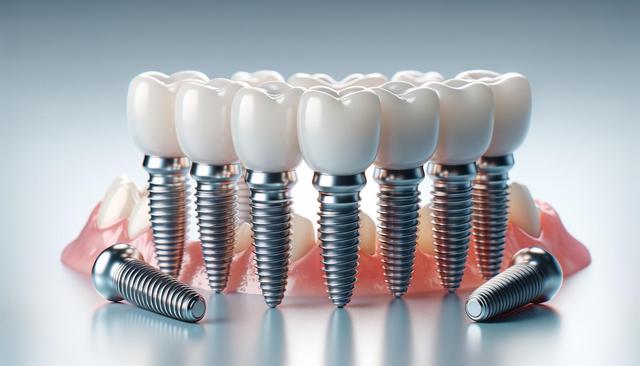What Are Dental Implants?
Dental implants are artificial tooth roots, typically made of titanium, that are surgically placed into the jawbone to support replacement teeth. They are designed to provide a stable foundation for fixed or removable prosthetic teeth that match the appearance and function of natural teeth. Unlike dentures or bridges, which rest on the gum line or rely on adjacent teeth for support, dental implants integrate directly with the jawbone, offering a more permanent and secure solution.
Over time, the implant fuses with the bone in a process called osseointegration. This not only provides stability but also helps preserve bone density, which can deteriorate after tooth loss. The key components of a dental implant system include:
- The implant post (surgically inserted into the jawbone)
- The abutment (a connector placed on top of the implant)
- The crown (the visible tooth replacement)
Dental implants are suitable for most healthy adults, especially those who have lost one or more teeth due to injury, decay, or periodontal disease.
Benefits of Dental Implants
There are multiple advantages to choosing dental implants over other tooth replacement options. One of the most significant benefits is their ability to restore both the function and appearance of natural teeth. This leads to improved oral health, self-confidence, and overall quality of life.
Some notable benefits include:
- Improved speech and comfort compared to removable dentures
- Enhanced chewing efficiency and taste sensation
- Prevention of bone loss and facial sagging
- Long-lasting results with proper care
- No need to alter adjacent teeth, as with bridges
Because dental implants mimic natural tooth roots, they provide a level of stability that other options often lack. This makes them particularly beneficial for individuals looking for a long-term investment in their oral health.
The Dental Implant Procedure
The process of getting dental implants typically involves several stages, spread over a few months. While it requires commitment, the outcome is often well worth the time and effort. The procedure begins with a comprehensive consultation, including X-rays and a thorough examination to determine if the patient is a suitable candidate.
The main steps include:
- Surgical placement of the implant into the jawbone
- Healing period for osseointegration (usually several weeks to a few months)
- Placement of the abutment and custom-designed crown
Throughout the healing phase, temporary teeth may be worn to maintain aesthetics and functionality. Once the final crown is placed, the dental implants should feel and function like natural teeth. Regular follow-ups and good oral hygiene are essential for long-term success.
Who Can Get Dental Implants?
Most adults in good general and oral health are potential candidates for dental implants. However, certain conditions need to be evaluated by a dental professional. Adequate jawbone density is crucial for supporting the implant, although bone grafting procedures can sometimes address deficiencies.
Ideal candidates include:
- Individuals missing one or more teeth
- People with healthy gums and sufficient bone structure
- Non-smokers or those willing to quit smoking
- Patients free from uncontrolled chronic diseases such as diabetes
Children and adolescents are typically not considered candidates until their jawbones have fully developed. A detailed assessment by a dental implant specialist can help determine whether implants are the right choice in each case.
Maintaining Dental Implants
Dental implants are known for their durability and longevity, often lasting many years with proper care. Like natural teeth, they require regular maintenance to prevent complications such as peri-implantitis, a condition similar to gum disease that affects the tissues around the implant.
Key maintenance tips include:
- Brushing twice daily with a soft-bristled toothbrush
- Flossing regularly using implant-friendly floss or tools
- Attending routine dental check-ups and cleanings
- Avoiding hard foods that could damage the crown
- Quitting smoking to reduce the risk of implant failure
Consistent oral hygiene and professional monitoring play an essential role in ensuring the longevity of dental implants. Patients should also inform their dentist of any discomfort or changes around the implant area promptly.
Conclusion: Is a Dental Implant Right for You?
Dental implants offer a reliable and aesthetically pleasing option for those seeking to replace missing teeth. Whether you’ve lost a tooth due to injury or disease, this solution can help restore your smile and maintain your oral health. With proper care and professional guidance, dental implants can serve as a long-term investment in your overall well-being. If you’re considering this treatment, consult a qualified dental professional to explore your options and determine whether implants align with your needs and lifestyle.






